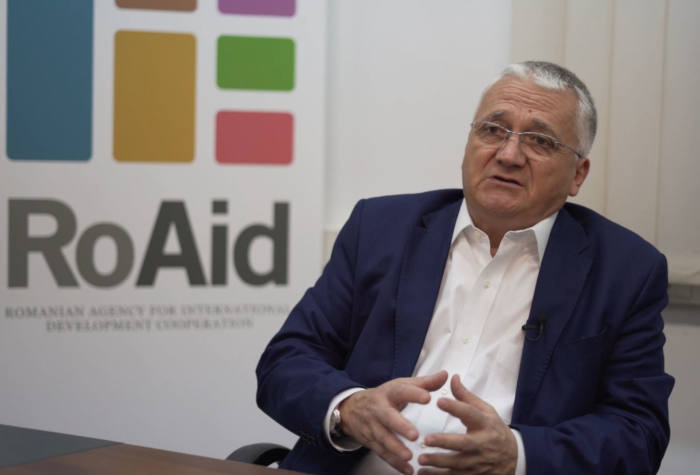-
06 February 2020
Category : Interview
“Our projects are based on Romanian foreign policy priorities”
We interview Cătălin Harnagea, director of RoAid, the Romanian development cooperation agency
 Cătălin Harnagea during the interview
Cătălin Harnagea during the interviewRoAid is Romania’s international development cooperation agency, which combines the work of Romanian public institutions, civil society and the private sector, to foster global efforts to sustainably alleviate extreme poverty and support stronger democratic institutions in developing countries.
Romania, which joined the EU in 2007, also became an official development assistance donor (ODA) the same year. This was when the country joined the efforts by the international community to support the economic, social and political welfare of developing countries.
Cătălin Harnagea is the director of RoAid and we had the opportunity to ask him about the newly created agency.
Let’s talk about RoAid.
Ours is a very young agency. We have been working for a little over a year and a half, since spring 2018. We have now carried out some missions and started projects; and in addition to our agency’s goals with our partner countries, we also want to raise the profile of our work in the European Union, for example through our recent access to the Practitioner’s Network.
How was the agency set up and how has it evolved during this time?
Until two years ago, we had a special unit within the Romanian Ministry of Foreign Affairs, whose function was to develop policies and establish development cooperation priorities in Romania. Now, in collaboration with this Ministry and with other institutions, as well as formulating policies and priorities, we also implement these policies through our projects.
What can you tell us about the projects you are now managing?
Our projects are based on Romanian foreign policy priorities, which have very important objectives in the countries and regions around Romania, including the Black Sea region and the Western Balkans. In addition, there are specific opportunities and projects in Moldova, in Ukraine, and in Georgia. Also, in 2020 we hope to start working in Armenia, Serbia, Albania, Bosnia Herzegovina and other countries in the region.
I would also like to point out that our thematic priorities are 100% based on the Sustainable Development Goals of the 2030 Agenda and, with this support, we are developing and implementing some projects in Africa, such as in the Congo in the field of energy, as well as others in Zambia, Tanzania, Malawi and Zimbabwe. In fact, we going to sign a trilateral agreement between the Romanian Ministry of Foreign Affairs and the African Union.
We have also prioritised contact with other agencies such as KOICA, a Korean cooperation agency with which we have signed a memorandum of understanding and we have relationships with other agencies such as the Japanese JICA and, of course, European agencies such as those in Austria, the Czech Republic, and Spanish agencies, such as FIIAPP.
How do you rate your entry into the Practitioner’s Network, the network of European cooperation agencies?
We believe that it is a fundamental pillar to consolidate the implementation of development cooperation projects and, for us, this entry is very important because we want to understand what our strategic objectives are and which of these they consider to be the most important in the long, medium and short term.
The views and opinions expressed in this blog are the sole responsibility of the person who write them.




